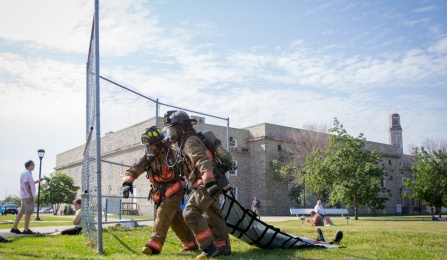This project will compare physiological responses across consecutive days of work in a hot environment

This project will compare physiological responses to consecutive days of work in hot/dry and hot/humid environments.
Principal Investigator: Riana R Pryor, PhD, ATC
Funding Agency: National Institute for Occupational Safety and Health (NIOSH)/Centers for Disease Control and Prevention (CDC)
Abstract: Workers repeatedly endure physically demanding tasks for prolonged periods of time, resulting in consecutive days of substantial physical fatigue. Worker fatigue increases the risk of musculoskeletal and traumatic injuries such as lower back disorders, tendinopathies, slips, trips, and falls. To identify workers at risk of injury due to accumulated fatigue at the worksite, a real-time field assessment technique is needed to allow for a timely intervention before injury occurs, potentially preventing harmful or life-threatening injury. One promising, low-cost, easy-to-use wearable physiological monitoring sensor is an accelerometer, which has been successfully implemented in research settings. Due to the relatively new use of accelerometry to quantify fatigue, changes in fatigue variables calculated from these devices during long-duration, heavy intensity work as well as across consecutive days of work has not yet been established. This project will quantify fatigue incurred during consecutive days of heavy work in a hot environment.
Additionally, working in a hot environment results in a dramatic reduction in renal blood flow, leading to a reduced glomerular filtration rate. While this normal reduction in kidney function is transient and considered to be benign, approximately 20% of individuals in heat stress studies of workers in hot environments met the threshold for acute kidney injury. It is unclear whether these individuals truly had acute kidney injury or if these were normal healthy physiologic responses. To better determine if acute kidney injury occurs in the staggering number of workers previously reported, an assessment of kidney function and acute kidney injury biomarkers during worker heat stress is needed. This project will determine the impact of consecutive days of heat stress on biomarkers of acute kidney injury.



